[Event Report] Symposium on "The significance of newspapers in our digital society" - Panel discussion among media stakeholders and researchers (held on September 17, 2021)
2022.05.12Video Archive (Only available in Japanese)
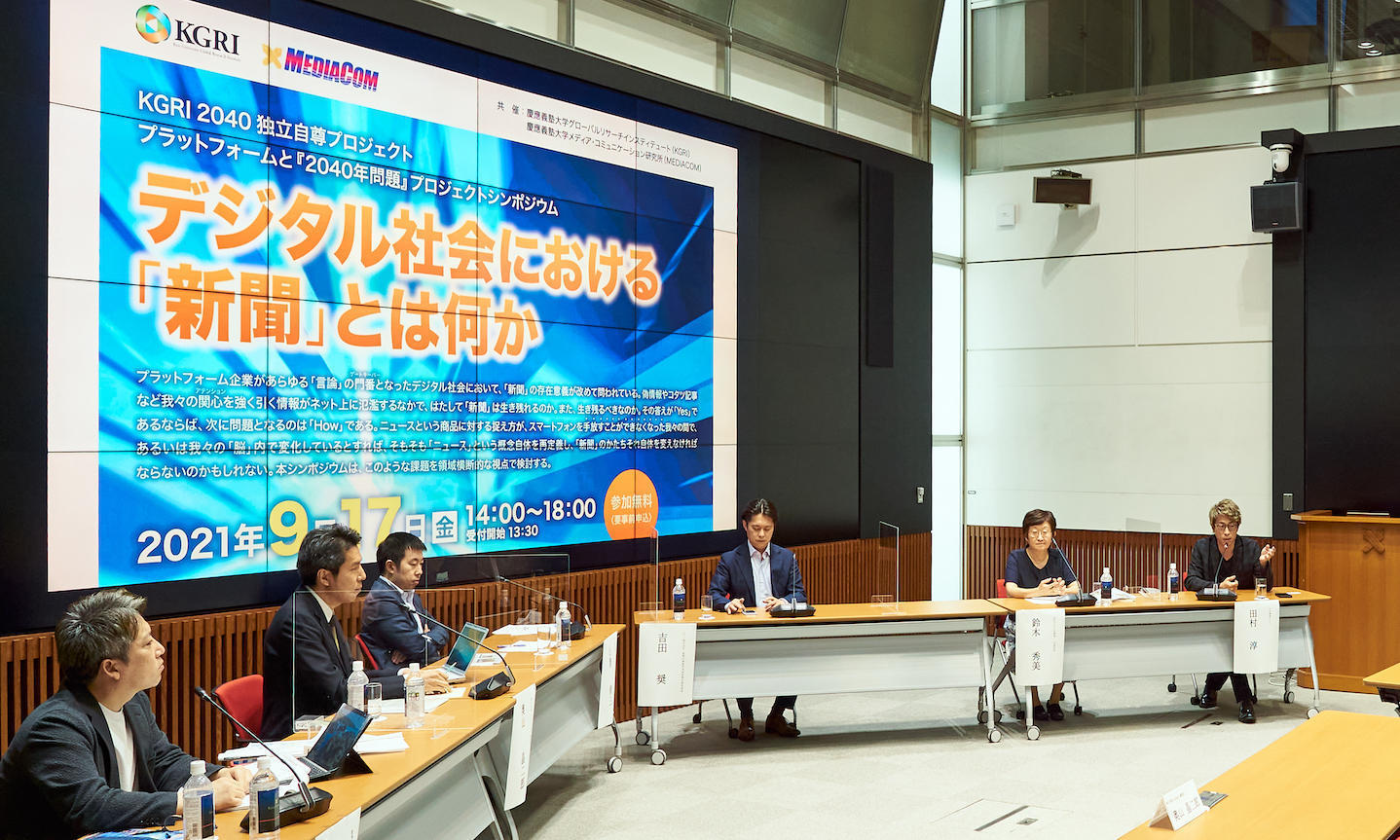
As part of"Platforms and '2040 Problem' Project", one of the pillars of KGRI's "Research Project Keio 2040", we hosted a symposium on "The significance of newspapers in our digital society" on September 17th, 2021. (*1)
In the digital society that we live in today, the information circulated within society are being controlled and monitored by platform enterprises. The internet is full of fake news and so-called "kotatsu critiques" (kotatsu is a Japanese table with a built-in foot warmer). People are beginning to question the concept and role of journalism. Will newspapers be able to survive through such era? Or will they diminish?
We began the symposium with lectures by newspaper journalists, web media writers, platformers, and researchers, followed by a panel discussion with Professor Hidemi Suzuki, who is also the vice director of the Keio University Institute for Journalism, Media & Communication Studies (MediaCom) co-hosting this symposium, and TV talent Atsushi Tamura from Yoshimoto Kogyo as guest panelists. The panel discussion was held among people with different roles in the media--- those who deliver content, those who provide the platform, and those who use the information. We hope to share the excitement of this session in this event report. (*2)
(*1) Co-hosted by Keio University Global Research Institute (KGRI) and Keio University Institute for Journalism, Media & Communication Studies (MediaCom).
(*2) This symposium was reported in 2 posts, one on the panel discussion and the other on the "after-session" (student forum, only available in Japanese).

Symposium on "The significance of newspapers in our digital society"
Platform enterprises continue to grow immensely with the expansion of digital networks. The "Platforms and '2040 Problem' Project" was launched in aim to understand the unprecedented impact that these developments have on the order of our society and to resolve legal and ethical issues that have aroused with these changes.
There are many issues that we address in this project. One issue is the various conflicts caused by fake news and "kotatsu critiques" in the new types of media that have developed with the expansion of platforms. Will newspaper journalism, which has shaped democracy by allowing the people to practice their "rights to know", be able to survive in this drastically changing environment surrounding the media? We hosted this symposium on "The significance of newspapers in our digital society" in hope to shed light to this issue that jeopardizes the people's freedom of opinion and expression.
In response to COVID-19, this symposium was held in hybrid form, with some participants onsite and some online. Below is a list of speakers and the title of the lectures they delivered during the first half of the symposium.
- Shojiro Okuyama (Editor in Chief of "withnews" of Asahi Shimbun) "How to deliver news that people don't want to read"
- Kohei Sakaki (Assistant Professor at Institute of Development, Aging and Cancer, Tohoku University) "Brain activity when using smartphones and children's academic ability"
- Shuzou Yamakoshi (Professor at Department of Politics, Faculty of Law, Keio University) "The potential of journalism in a digital society"
- Susumu Yoshida (Vice President, Public Affairs Division, Yahoo Japan Corporation) "Values of web news--- from a platformer's perspective"
A panel discussion and a student-led forum ("after-session") were held during the latter half of this symposium. This report is a digest of the panel discussion in which panelists talked about the themes addressed in the lectures delivered in the beginning of the symposium.
Panelists (alphabetical order): Shojiro Okuyama Editor in Chief of "withnews" (Asahi Shimbun) Kohei Sakaki Assistant Professor at Institute of Development, Aging and Cancer, Tohoku University (online participation) Hidemi Suzuki Professor & Vice Director, Keio University MediaCom Atsushi Tamura London Boots Ichi-go, Ni-go (Yoshimoto Kogyo Co., Ltd.) Shuzou Yamakoshi Professor at Department of Politics, Faculty of Law, Keio University Susumu Yoshida Vice President, Public Affairs Division, Yahoo Japan Corporation
Moderator: Tatsuhiko Yamamoto Professor at Keio University Law School & Vice Director of KGRI
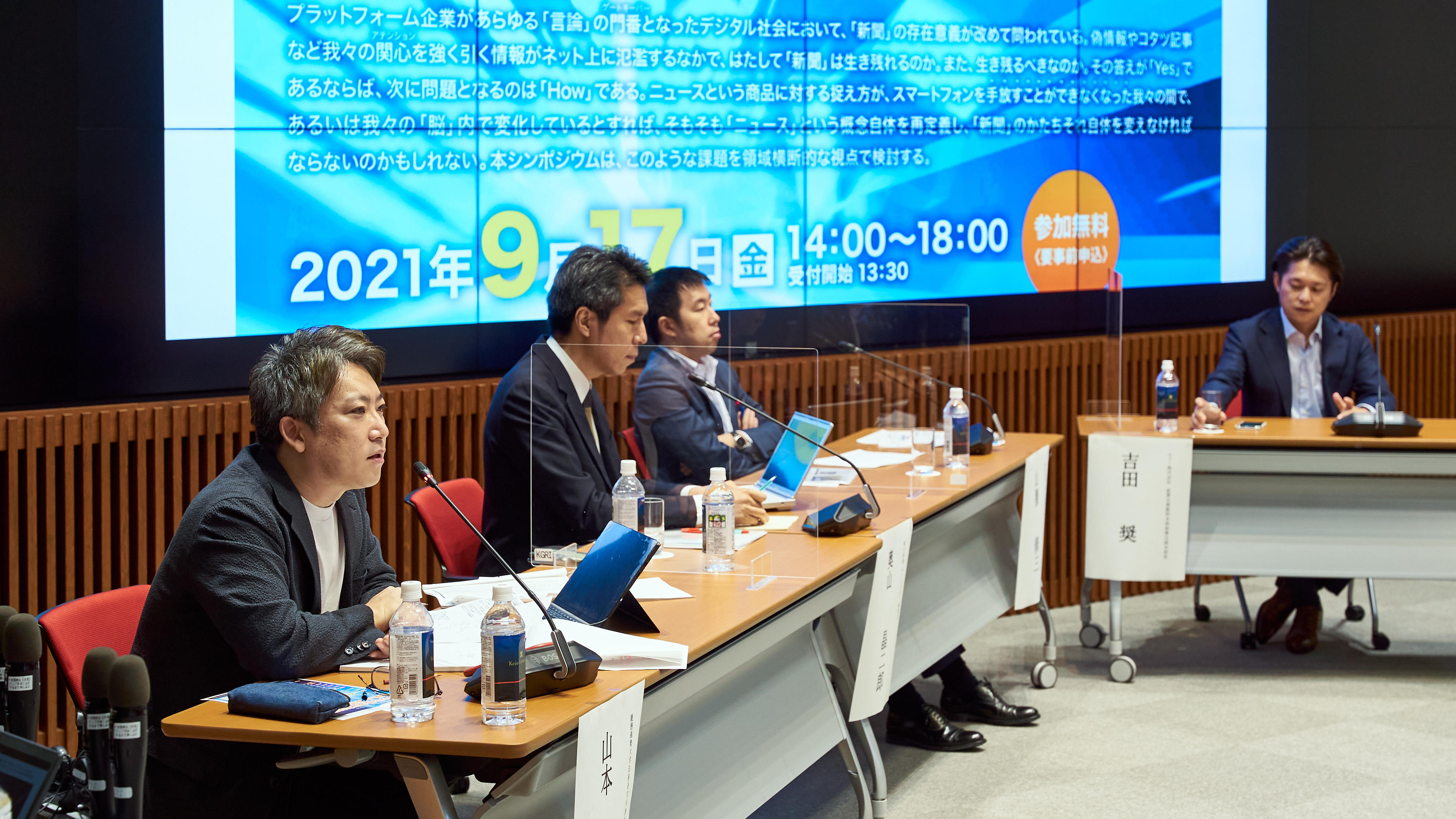
Newspaper & web media, and its issues
Tatsuhiko Yamamoto: Today, we welcome Mr. Atsushi Tamura as our guest panelist. He studied on wills at Keio University Graduate School of Media Design and earned his degree this spring. As a publicly known figure and his rich experience as an interviewee, I think he can raise questions on today's speech space. I have also requested 3 panelists to comment on today's theme. We will be holding a free discussion after we hear from these panelists.
Atsushi Tamura: I'm not a proactive reader of newspapers and honestly, I don't find it inconvenient. But I do think a lot about how I can gather high quality information. I am especially concerned about "kotatsu critiques" which are written without collecting much data. These critiques are written based on assumptions on information gathered from TV news and the web, often distorting the truth and adding catchy subtitles in aim to earn click-through counts. I feel a strong sense of resentment towards such media.
Hidemi Suzuki: Here is my opinion to the big question: "What's the difference between newspaper articles and web news?" Newspapers are regularly issued media that inform readers on social occurrences. Up until early 21st century, it has functioned as the central axis of our society as it was the primary source of information. Newspapers consolidate carefully selected information, allowing readers to grasp the values of each news at first glance by how it is laid out. Specifically, by the size of the article, whether it has a photo, and how it is headed. Another important feature is that it is distributed through a well-established delivery system. The core identity of newspapers lies in journalism. If it's a national newspaper, the company has a country-wide network to gather information for news coverage and has branch offices in primary cities overseas. Journalists are trained practical methods to collect evidential data to convey facts in their articles. However, the emergence of the internet has threatened the credibility of newspapers. Journalism has played a key role in our free and democratic society. We are now being questioned on how the roles of newspapers can be transferred to our digital society.
Kazuya Matsumoto (journalist): I have worked as an investigative journalist for the Asahi Shimbun and then transferred to become the editor in chief of a free speech website called "Ronza." After hearing today's lectures, I see that it is not individual media that are being questioned, but the foundation of our society being shaken to the core. I think one cause is the trend of "post-truth" in which emotional appeal seems to shape public opinion rather than objective data. Nowadays, there are more and more people around the world who don't seem to have any interest in differentiating facts from lies. In times like this, it all drills down to, "Are there any effective measures that media can take against this?"
Eijiro Mizutani (Associate professor at Kansai University): I study media law and information law, so I deeply understand the point of issue in the individualization of news induced by the collapse of news culture due to the emergence of the internet as Professor Yamakoshi and Mr. Okuyama mentioned in their lectures. On the other hand, this situation has offered people, who are not media stakeholders, the opportunity to think about what should be reported. It has shed light to the fact that newspaper companies were predominant in setting the standards for news values. In textbooks, it says that under the constitution, the press is responsible to serve its people for their rights to know. But is that really so in reality? I personally think that journalism should continue to stand as a discipline. Otherwise, the democracy of our society will be jeopardized. I think the key issue we need to address is how journalism, sustained by the expertise of professionals, can be guaranteed to be practiced in the world of the internet greatly influenced by "attention economy" in which attention not only captivates the readers but also generates economic values.
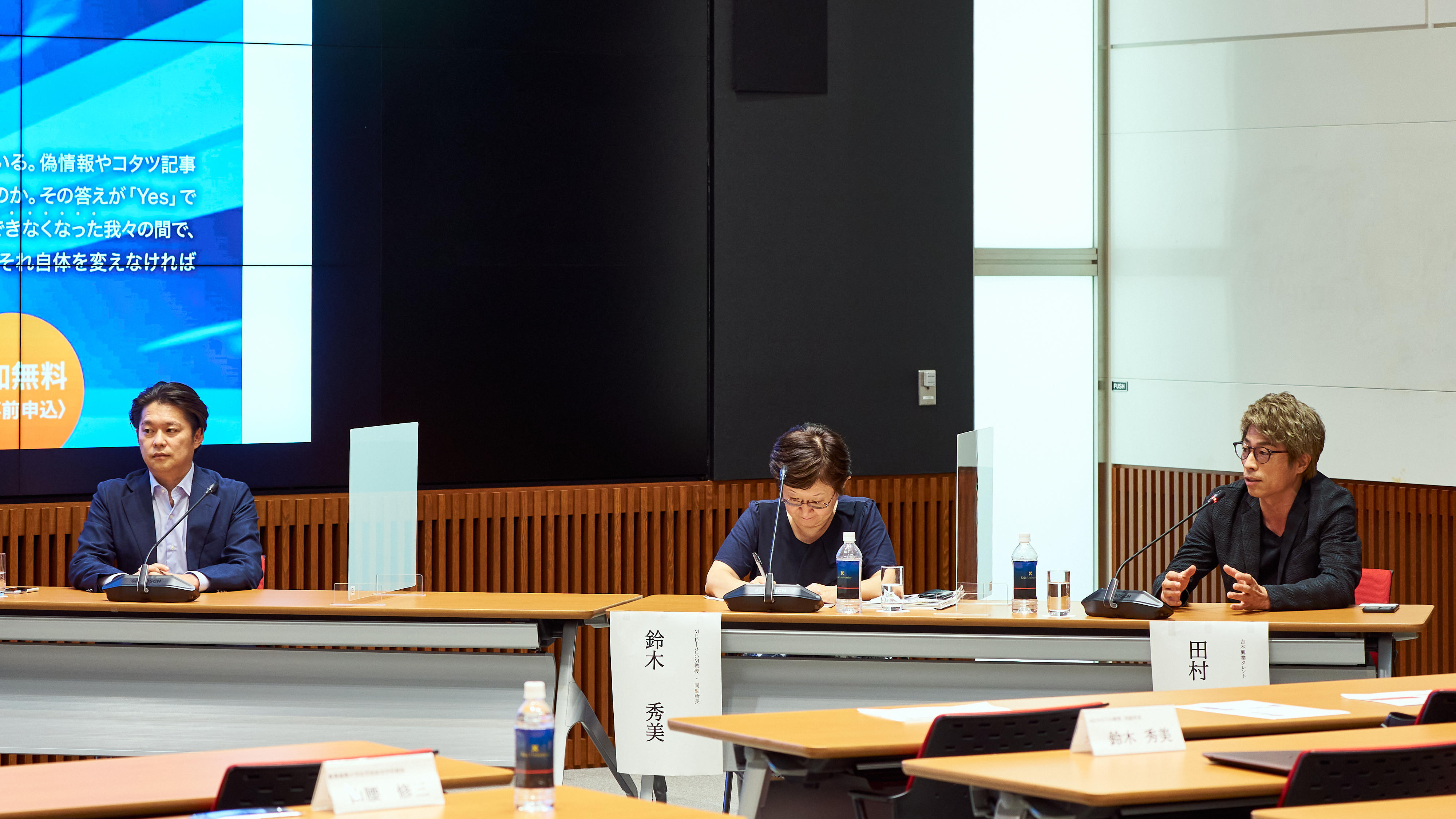
Yamamoto: The key point when discussing post-truth is if there are any truth in the article in subject. Conspiracy theorists tend to think that information found on the internet are all "truths", but it's really a matter of how the information is presented. A newspaper article can be said to be a compilation of information as presented by the journalist. In that sense, it's not much different from kotatsu critiques. I think it all drills down to how information is presented in a content.
Tamura: How does newspaper companies regard kotatsu critiques? What is the difference between such critiques and newspaper articles written by a professional journalist? I personally think that well-written kotatsu critiques can be regarded the same as newspaper articles.
Shojiro Okuyama: I agree that kotatsu critiques may become meaningful depending on how its content is presented. Until today, newspaper companies competed against each other based on who can discover and deliver scoops. In other words, it was all about "what to write" and not about how information was dressed or arrayed. In that sense, we have a lot to learn from kotatsu critiques.
Suzuki: Perhaps the cause for distrust towards mass communication is in the dogma that "the real truth is out there somewhere." Nowadays, there are more people that think the truth cannot be found in mass communication but on the internet. I think that truths can be found by those who pursue them.
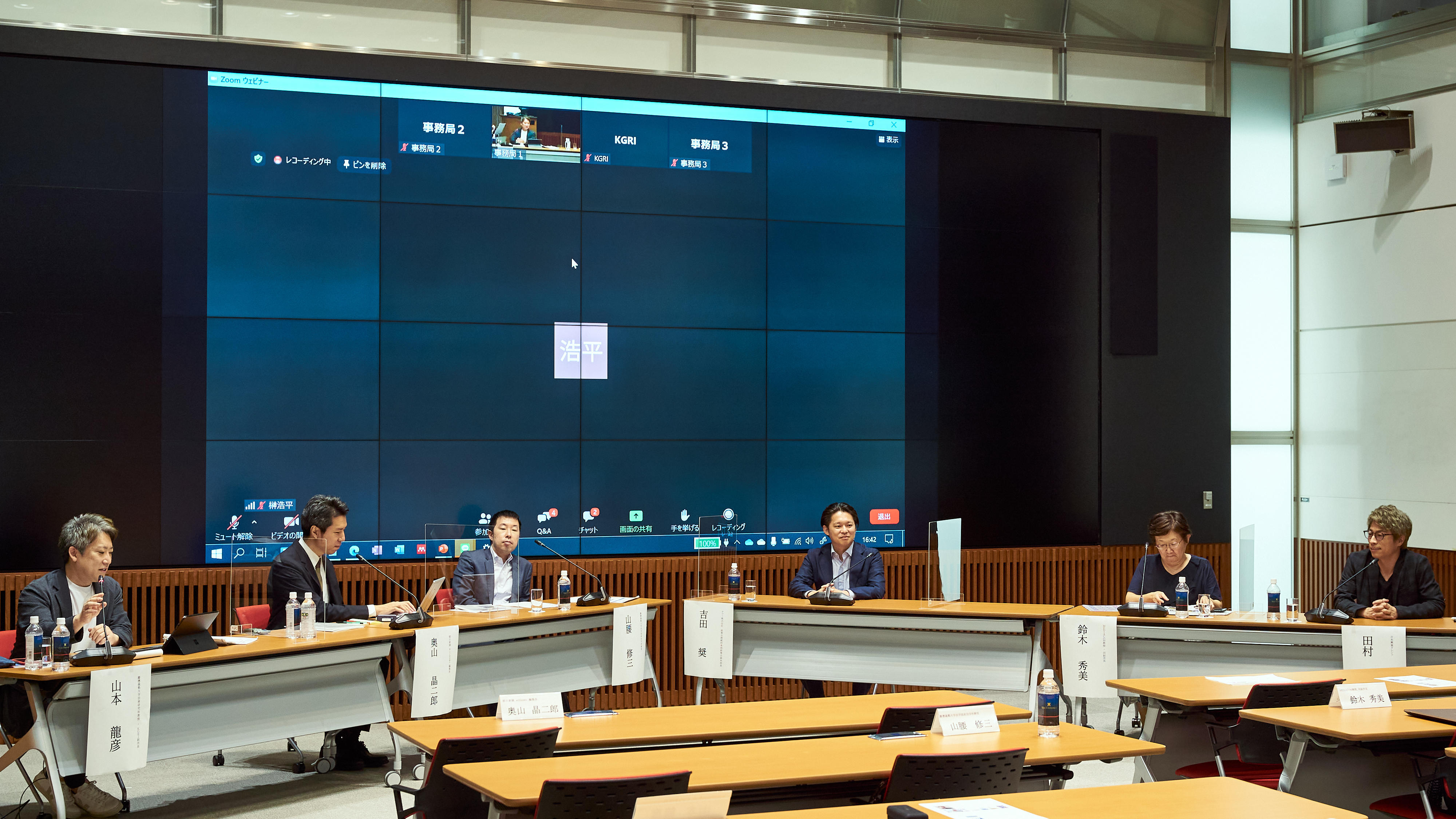
Social significance of newspaper journalism
Yamamoto: Let us hear from Professor Sakaki who has joined us today online. In your lecture, you talked about the use of smartphone and how it has an adverse effect on academic abilities. From your perspective, do you think that it is feasible to apply the advantages of paper-based media to digital media?
Kohei Sakaki: That's a very difficult question. With paper, there is an immense amount of information, such as the quality of the paper, that we start processing subconsciously. Thus, a wide area of the brain, including the prefrontal cortex, become highly activated. On the other hand, digital content is extremely stimulating, especially with use of vibrant colors and videos, but it only stimulates a part of the brain and brain activities only occur in that area. It is ironic that the less stimulating a content is, the more it is retained in our memory, but the less it is viewed by readers.
Shuzou Yamakoshi: I think the wave of digitalization is irreversible. When newspapers and journalism try to adapt to digitalization, it may get trapped in "attention economy" created by some of the mega platforms. But I'd like newspaper companies to lead new initiatives while protecting the news culture, rather than thinking about how to adapt. And to do that, I think newspapers need to explain to its reader the reasons why they wanted to cover a particular news and provide grounds for their article. Otherwise, the news culture will no longer be a shared concept among society in this digital age.
Matsumoto: Earlier, we discussed the difference between professional and amateur writers. No matter how small the coverage may be, as a journalist, I have always committed to investigate deep into the core and structure of the issue. I always kept in mind to be considerate of privacy and constantly questioned myself if I could be held accountable for the commonality and sociality of the article that I wrote. Perhaps, making this editing process visible and demonstrating to recognize mistakes is one way the media can survive in this society where more and more people are becoming distrustful or uninterested towards the media.
Tamura: Yes, and we should also think about why kotatsu critiques keep getting more click-through counts compared to articles written based on thorough research. It took me quite some time, but I have finally become able to judge whether an article was written based on research or not. But there are still many people who can't tell the difference and I think that's where journalists come into play. I want them to raise their voices and point out these differences. However, they should be careful not to be like TV producers criticizing YouTubers. I think it's not right for journalists to condescend "internet broadcasters."
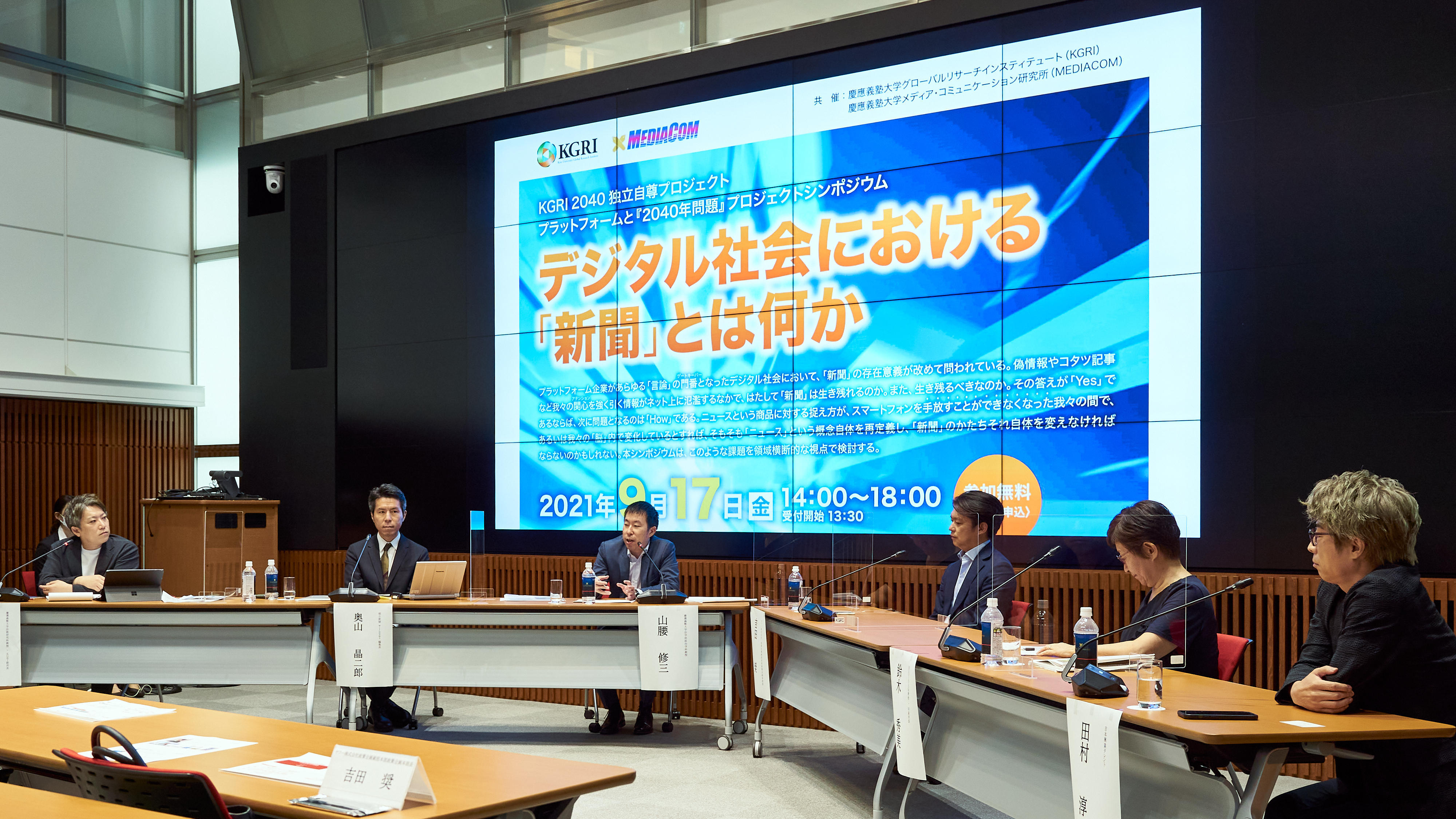
Yamamoto: Mr. Yoshida, based on your experience with "Yahoo! News", could you give us your opinion on how to find the balance between gathering attention and maintaining the commonality of the article?
Yoshida: I think there is a difference between media where individuals directly deliver content and platformers that have shaped the platform in cooperation with its content providers. I think we, platformers, are enterprises that provide content that readers want to read. So, we focus on providing data-based feedback on what the readers may be feeling to our content providers so that they may be able to create high quality content. We think that if we keep focusing on short-term merits of gathering attention, users will start feeling like they are being deceived and in the long run, there will be less and less click-through counts.
Suzuki: There is a difference in what journalism wants to convey and what users want to read. The other day, I heard that today's youths hate condescending attitudes. Until recently, elites led the society and the purpose of newspapers was to enlighten people. But now, the readers' perspectives will have a greater impact.
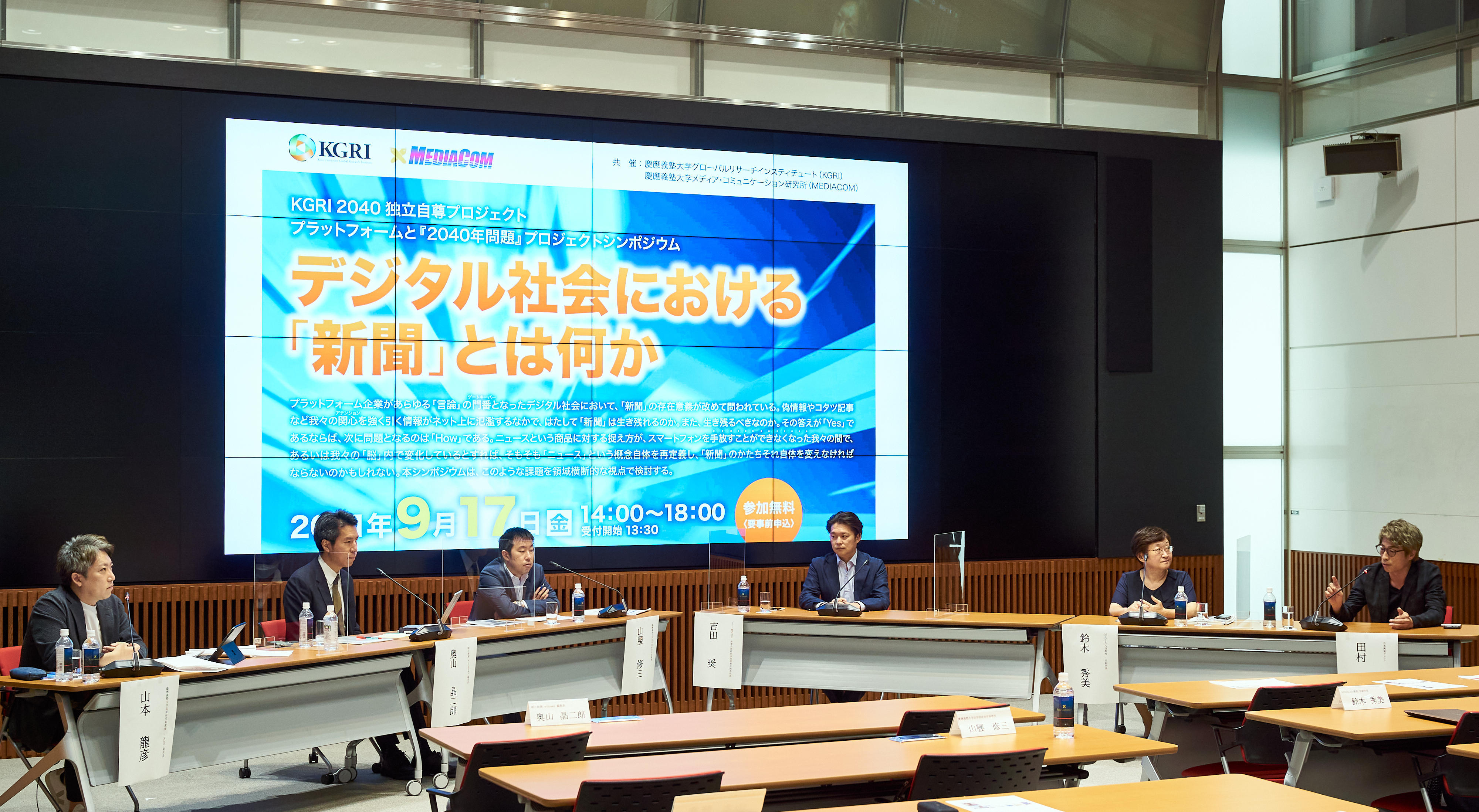
What is necessary to practice "healthy journalism"?
Yamamoto: I think we were able to hold a fruitful discussion even though time was limited. Thank you. Last but not least, could each of you give us your closing comments?
Tamura: As Mr. Matsumoto pointed out, I think it is critical that the media apologizes if they made any mistakes and show their commitment to identify where the problem lies. I have previously made claims about an article on a completely unfounded rumor. And all they did was write a sentence of apology in really small characters on their website. It's no wonder the media is losing credibility. From this experience, I strongly felt that the media can build their credibility by apologizing and explaining their stances in a dignified manner.
Okuyama: When we reported the tampering of an official document in "withnews", we wrote on article on why official documents should not be tampered with in the first place. I think it was the lack of effort by newspaper companies that they regarded this issue as an axiomatic truth and neglected to feature topics like this. I will definitely bring back what we have discussed here today to my company and would like to dig deeper into this.
Yamakoshi: The "post-truth" issue that Mr. Matsumoto addressed not only fragments the society but also jeopardizes the democracy of our society in the sense that it inhibits any controversies to occur. In this digital era, we must not only think of the commonality of newspapers and news culture from an industrial standpoint but also think about how it affects the dynamism of society.
Yoshida: As a platformer, I think increasing the transparency of the measures we take will lead to earning trust from our users. I want to encourage my people to proactively disclose our own scandals and encourage our content providers to agree on posting correction articles on their web site in a spot where it is likely to catch the viewers' eyes. As for measures taken for fake news and false accusations, we'd like to continue working with other organizations of our industry.
Sakaki: Today's discussion was based on perspectives that were much different from those discussed in the conferences I typically attend, and I was able to gain new insights. As a new topic, I plan on studying on how people can create web news that will be as unforgettable as newspaper articles. I hope that there will be another opportunity like today for me to present my research.
Suzuki: Out of regret that freedom of expression was oppressed before the War, Japan is hesitant to lay down rules and regulations for the media. However, I believe that rules and regulations, like the media's exemption from the application of the Act on the Protection of Personal Information that was enacted, are ever more necessary to maintain healthy journalism in our country.
Yamamoto: To practice the people's right to know and construct a framework that supports this, efforts to self-reform must also be made by newspapers which will be supported within this framework. I think further discussion is necessary on the sustainability of newspapers, such as the accountability and visualization of the media. Speaking on behalf of Keio University, we are determined to continue hosting such discussions.
Rinko Furushima (Junior at Tatsuhiko Yamamoto Group, Faculty of Law, Keio University): I'd like to thank everyone for your participation. Let us now move on to the closing speech of this symposium by Professor Sawai.
Atsushi Sawai (Professor at Faculty of Law, Keio University & Director of MediaCom): The environment surrounding the media is changing ever more quickly and we are facing extremely fundamental issues: What is journalism? Which information can be regarded as credible? It has only been 10+ years since it became normal for individuals to offer first-hand information, owing to the proliferation of smartphones. As an after-session of this discussion, there will be a student-led forum. Note that these students are natives to the media environment that we know of today. Though the difference in generation may be very slight, the interactions that each generation has with the media are very different. And I believe that understanding these differences and holding discussions among people with different norms are critical. Once again, thank you all for your participation.
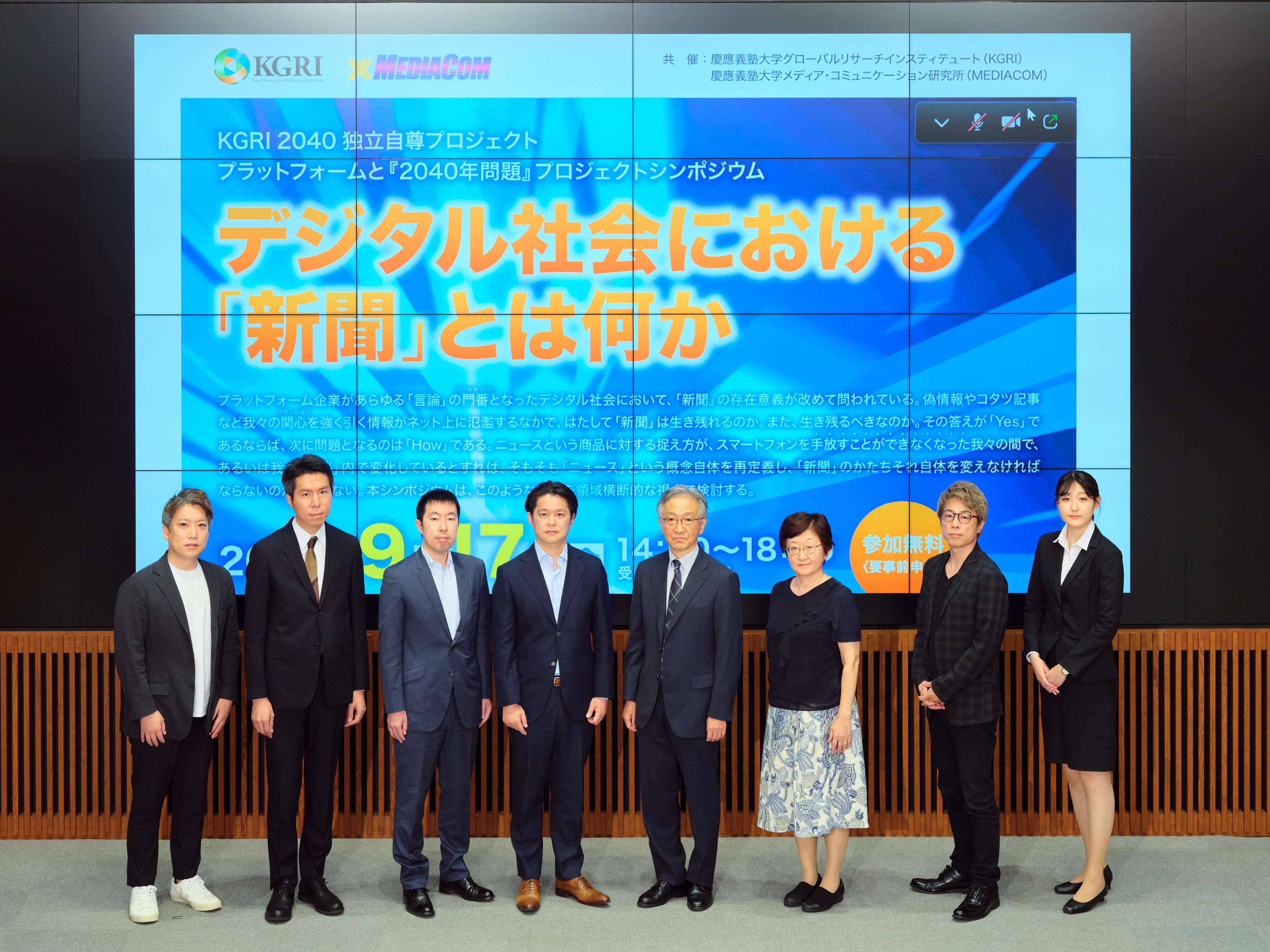
Symposium held in hybrid form (onsite and online) at G-Lab (East Research Building, Mita Campus) on September 17, 2021.
*Affiliations and job titles are as of the date the event was held.





